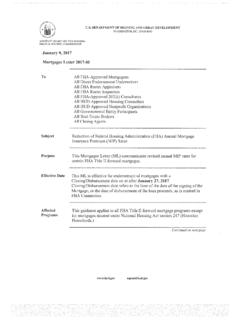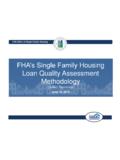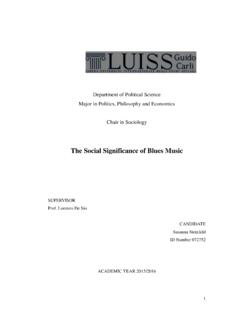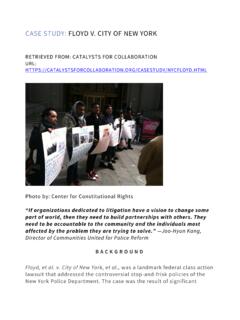Transcription of U.S. DEPARTMENT OF HOUSING AND URBAN DEVELOPMENT ...
1 DEPARTMENT OF HOUSING AND URBAN DEVELOPMENT . WASHINGTON, DC 20410-0500. April 4, 2016. Office of General Counsel Guidance on Application of Fair HOUSING Act Standards to the Use of Criminal Records by Providers of HOUSING and Real Estate-Related Transactions I. Introduction The Fair HOUSING Act (or Act) prohibits discrimination in the sale, rental, or financing of dwellings and in other HOUSING -related activities on the basis of race, color, religion, sex, disability, familial status or national HUD's Office of General Counsel issues this guidance concerning how the Fair HOUSING Act applies to the use of criminal history by providers or operators of HOUSING and real-estate related transactions.
2 Specifically, this guidance addresses how the discriminatory effects and disparate treatment methods of proof apply in Fair HOUSING Act cases in which a HOUSING provider justifies an adverse HOUSING action such as a refusal to rent or renew a lease based on an individual's criminal history. II. Background As many as 100 million adults or nearly one-third of the population have a criminal record of some The United States prison population of million adults is by far the largest in the As of 2012, the United States accounted for only about five percent of the world's population, yet almost one quarter of the world's prisoners were held in american Since 2004, an average of over 650,000 individuals have been released annually from federal and state prisons,5 and over 95 percent of current inmates will be released at some When individuals are released from prisons and jails, their ability to access safe.
3 Secure and affordable HOUSING is critical to their successful reentry to Yet many formerly incarcerated individuals, as well as individuals who were convicted but not incarcerated, encounter significant barriers to securing HOUSING , including public and other federally-subsidized HOUSING , 1. 42 3601 et seq. 2. Bureau of Justice Statistics, Dep't of Justice, Survey of State Criminal History Information Systems, 2012, 3. (Jan. 2014), available at 3. Nat'l Acad. Sci., Nat'l Res. Couns., The Growth of Incarceration in the United States: Exploring Causes and Consequences 2 (Jeremy Travis, et al. eds., 2014), available at: incarceration-in-the-united-states-explo ring-causes.
4 4. Id. 5. E. Ann Carson, Bureau of Justice Statistics, Dep't of Justice, Prisoners in 2014 (Sept. 2015) at 29, appendix tbls. 1 and 2, available at 6. Bureau of Justice Statistics, Dep't of Justice, Reentry Trends in the United States, available at 7. See, , S. Metraux, et al. Incarceration and Homelessness, in Toward Understanding Homelessness: The 2007. National Symposium on Homelessness Research, #9 (D. Dennis, et al. eds., 2007), available at: (explaining how the increasing numbers of people leaving carceral institutions face an increased risk for homelessness and, conversely, how persons experiencing homelessness are vulnerable to incarceration.)
5 Because of their criminal history. In some cases, even individuals who were arrested but not convicted face difficulty in securing HOUSING based on their prior arrest. Across the United States, african Americans and Hispanics are arrested, convicted and incarcerated at rates disproportionate to their share of the general Consequently, criminal records-based barriers to HOUSING are likely to have a disproportionate impact on minority home seekers. While having a criminal record is not a protected characteristic under the Fair HOUSING Act, criminal history-based restrictions on HOUSING opportunities violate the Act if, without justification, their burden falls more often on renters or other HOUSING market participants of one race or national origin over another ( , discriminatory effects liability).
6 9 Additionally, intentional discrimination in violation of the Act occurs if a HOUSING provider treats individuals with comparable criminal history differently because of their race, national origin or other protected characteristic ( , disparate treatment liability). III. Discriminatory Effects Liability and Use of Criminal History to Make HOUSING Decisions A HOUSING provider violates the Fair HOUSING Act when the provider's policy or practice has an unjustified discriminatory effect, even when the provider had no intent to Under this standard, a facially-neutral policy or practice that has a discriminatory effect violates the Act if it is not supported by a legally sufficient justification.
7 Thus, where a policy or practice that restricts access to HOUSING on the basis of criminal history has a disparate impact on individuals of a particular race, national origin, or other protected class, such policy or practice is unlawful under the Fair HOUSING Act if it is not necessary to serve a substantial, legitimate, nondiscriminatory interest of the HOUSING provider, or if such interest could be served by another practice that has a less discriminatory Discriminatory effects liability is assessed under a three-step burden-shifting standard requiring a fact-specific The following sections discuss the three steps used to analyze claims that a HOUSING provider's use of criminal history to deny HOUSING opportunities results in a discriminatory effect in violation of the Act.
8 As explained in Section IV, below, a different analytical framework is used to evaluate claims of intentional discrimination. 8. See infra nn. 16-20 and accompanying text. 9. The Fair HOUSING Act prohibits discrimination based on race, color, religion, sex, disability, familial status, and national origin. This memorandum focuses on race and national origin discrimination, although criminal history policies may result in discrimination against other protected classes. 10. 24 ; accord Texas Dep't of Hous. & Cmty. Affairs v. Inclusive Cmtys. Project, Inc., ___ ___, 135 S. Ct. 2507 (2015). 11. 24 ; see also Inclusive Cmtys.
9 Project, 135 S. Ct. at 2514-15 (summarizing HUD's Discriminatory Effects Standard in 24 ); id. at 2523 (explaining that HOUSING providers may maintain a policy that causes a disparate impact if they can prove [the policy] is necessary to achieve a valid interest. ). 12. See 24 2. A. Evaluating Whether the Criminal History Policy or Practice Has a Discriminatory Effect In the first step of the analysis, a plaintiff (or HUD in an administrative adjudication). must prove that the criminal history policy has a discriminatory effect, that is, that the policy results in a disparate impact on a group of persons because of their race or national This burden is satisfied by presenting evidence proving that the challenged practice actually or predictably results in a disparate impact.
10 Whether national or local statistical evidence should be used to evaluate a discriminatory effects claim at the first step of the analysis depends on the nature of the claim alleged and the facts of that case. While state or local statistics should be presented where available and appropriate based on a HOUSING provider's market area or other facts particular to a given case, national statistics on racial and ethnic disparities in the criminal justice system may be used where, for example, state or local statistics are not readily available and there is no reason to believe they would differ markedly from the national National statistics provide grounds for HUD to investigate complaints challenging criminal history Nationally, racial and ethnic minorities face disproportionately high rates of arrest and incarceration.
















